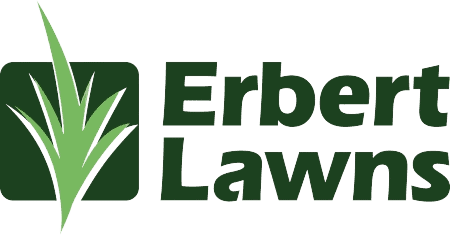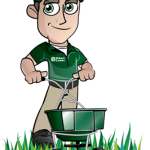Natural products are all the rage right now, especially for organic lawn care. There’s a toxic free alternative for everything these days: dish soap, laundry detergents, all purpose cleaners, etc. We often have our customers ask us if there is an organic or all natural alternative when it comes to lawn care.
First let’s talk about some common myths circling the internet.
Myth #1: Baking Soda & Vinegar Can Be Used As Weed Control
RoundUp is a commonly used non-selective herbicide that is specifically formulated to kill any plants it is sprayed on. This includes all weeds, anything growing in a vegetable garden, and also grass. RoundUp is the king of weed killers. There are also herbicides that only kill weeds and leave the grass intact. These are the types of weed control we opt for using at Erbert Lawns. RoundUp and other herbicides have gotten some pretty bad press lately. Many believe that all herbicides cause cancer and therefore seek out a more natural alternative to control the weeds in their lawn.
Baking soda and vinegar can be effective with controlling small weeds. Baking soda acts as a desiccant. This means it will dry out weeds and eventually kill them. Vinegar kills weeds by altering the pH of the soil. However, both of these can do more harm than good. They are not formulated to kill weeds specifically. Any grass or other nearby plants will also suffer the effects.
The only true organic way to control weeds without damaging your lawn is by pulling them up individually by hand. It is a lot of work and requires consistent upkeep.
Myth #2: Dish Soap Can Be Used As Insect Control
While it is true that your household dish soap can kill insects, it doesn’t really work as a preemptive measure against them. The dish soap must be directly applied to the insect in order to suffocate them. Dish soap contains some ingredients that are the opposite of beneficial for your lawn such as dyes, phosphates, and bleach. Using dish soap isn’t really an organic or natural option that it’s hyped up to be.
If you need a way to control insects in your lawn but want to avoid sprays there are specially formulated insecticidal soaps you can use. These are naturally derived from potassium salts making them safe for grass and other plants.
Myth #3: Beer & Soda Can Be Used As Fertilizer
We suspect this myth of beer being used as fertilizer came to be since the carbonation, carbohydrates and yeast are thought to be composed of the macronutrients grass requires to thrive. But the alcohol is not going to be good for your lawn and also the high sugar content of soda is a no go as well. Even purchasing the cheapest beer and soda, using this as fertilizer would be very costly. There are organic fertilizer options available at most stores. We also offer an organic fertilizer at Erbert Lawns that contains all the necessary ingredients your lawn needs.
The Real “Secret” To Having a Healthy Lawn Naturally
People are always worried about their lawn once it’s already in rough shape. What really keeps your lawn healthy is maintaining its health before it gets to that point. The two most important things to concern yourself with are soil and grass type.
Every aspect of your lawn’s health comes from the soil. This is where your grass lives and eats. While there are other things that can negatively affect your lawn (drought, insects, etc.), healthy soil leads to healthy roots. A healthy root system makes your lawn much more capable of handling stress.
You’ll also want to be sure to use high quality seed. For Colorado lawns we recommend a mixture of Kentucky Bluegrass and Perennial Ryegrass over other species like Fescue. This will ensure that you are only planting the best grass in your lawn.
Call or text Erbert Lawns today to set up a custom plan tailored to your lawns needs. We believe that every lawn can be lush and green!











